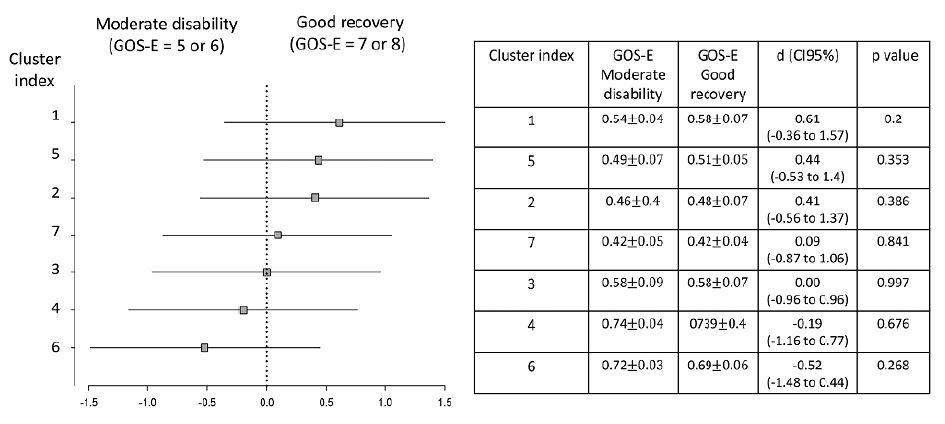ABSTRACT
Background:
Diffuse axonal injury occurs with high acceleration and deceleration forces in traumatic brain injury (TBI). This lesion leads to disarrangement of the neuronal network, which can result in some degree of deficiency. The Extended Glasgow Outcome Scale (GOS-E) is the primary outcome instrument for the evaluation of TBI victims. Diffusion tensor imaging (DTI) assesses white matter (WM) microstructure based on the displacement distribution of water molecules.
Objective:
To investigate WM microstructure within the first year after TBI using DTI, the patient’s clinical outcomes, and associations.
Methods:
We scanned 20 moderate and severe TBI victims at 2 months and 1 year after the event. Imaging processing was done with the FMRIB software library; we used the tract-based spatial statistics software yielding fractional anisotropy (FA), mean diffusivity (MD), axial diffusivity (AD), and radial diffusivity (RD) for statistical analyses. We computed the average difference between the two measures across subjects and performed a one-sample t-test and threshold-free cluster enhancement, using a corrected p-value < 0.05. Clinical outcomes were evaluated with the GOS-E. We tested for associations between outcome measures and significant mean FA clusters.
Results:
Significant clusters of altered FA were identified anatomically using the JHU WM atlas. We found increasing spotted areas of FA with time in the right brain hemisphere and left cerebellum. Extensive regions of increased MD, RD, and AD were observed. Patients presented an excellent overall recovery.
Conclusions:
There were no associations between FA and outcome scores, but we cannot exclude the existence of a small to moderate association.
Keywords:
Craniocerebral Trauma; Diffuse Axonal Injury; Diffusion Tensor Imaging; Glasgow Outcome Scale; Regeneration

 Thumbnail
Thumbnail
 Thumbnail
Thumbnail
 Thumbnail
Thumbnail
 Thumbnail
Thumbnail
 FA: fractional anisotropy.
FA: fractional anisotropy.
 FWE: family-wise error; MD: mean diffusivity; AD: axial diffusivity; RD: radial diffusivity.
FWE: family-wise error; MD: mean diffusivity; AD: axial diffusivity; RD: radial diffusivity.

